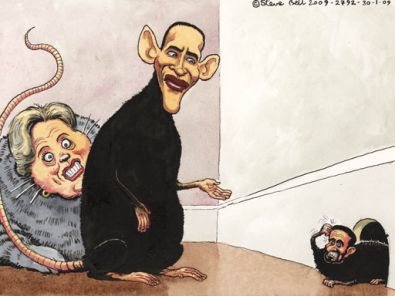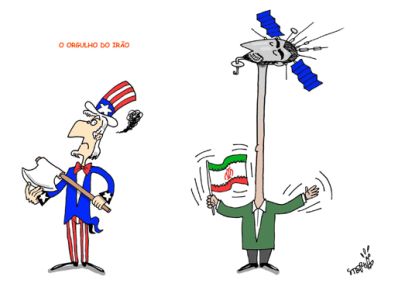
[Guardian
Unlimited, U.K.]
Liberation, France
Ahmadinejad Threatened
By the 'Obama Effect'
"The 'Obama Effect' is
powerful in Tehran. It has altered the political landscape not only for the population,
but among leaders who see the necessity of grabbing Obama's extended hand Ö By
immediately opening talks with Ahmadinejad, the U.S. could help him retain
power - but by putting pressure on him before Iran's presidential election, it
could lead to a more rapid agreement. For Washington, this is no easy choice."
By Bernard Guetta
††††††††††††††††††††††††††††††††† 
Translated By Kate Davis
February 19, 2009
France - Liberation - Original Article
(French)
"Letís start with Mohammad Khatami," he said right away. I had come to ask this figure
of the Iranian revolution, exiled in Europe, if the reformist ex-president
could win the presidential election in June and why Mahmoud Ahmadinejad, the
current president, so quickly accepted Barack Obamaís overtures. "The
two things are linked," he said. It's because Khatami's
candidacy is a threat to him that Ahmadinejad has softened his approach on all
the issues.
But
first, a refresher. From afar, the Islamic Republic seems as uniform as the
headscarf imposed on its women. Up close, it's a country with an intense
political life, a double country, both theocratic and democratic, where the
confiscation of power by the mullahs doesn't prevent their divisions from
playing out on the public stage or elections from affecting the course of
events because, as strictly as the regime controls them, their election results
arenít rigged.
There
are two powers in Iran: the citizens who elect the president and members of
parliament, and the religious hierarchy whose authority shapes the nation's
republican institutions. With the Supreme Leader at its head, this second power is the real one.
The armed forces, the courts and television are all subordinate to it. Without
its approval, no one can seek elective office but, in preparing the list of
eligible candidates, the leader, Ali Khamenei, can no longer ignore the state
of public opinion or the balance of power within the clergy. And the two, said
this connoisseur on Iranian affairs, now look unfavorably on the incumbent president.
Ahmadinejadís electoral promises have, in fact, turned against him.
To "bring the oil money" to the tables of the poorest, as he promised
four years ago, he twisted the arm of the central bank and increased subsidies
for societyís rejects, but also allowed inflation to run rampant so that even
the price of vegetables is now unaffordable. The collapse of oil prices and
international sanctions provoked by the nuclear arms race did the rest. They
have, together, succeeded in emptying the stateís coffers. The Iranian economy
is in ruins and, not only has the popularity of the incumbent president dropped
among those at the bottom of the social ladder, but the elites, those in the
regime and throughout society, now see him only as irresponsible and incapable
- someone who must be gotten rid of.
This consensus threatens Ahmadinejadís reelection to such an extent that the Leader [Khamenei], after having helped him get elected to block
reformers and the most realistic conservatives, sought to rush to his aid by
blocking any other conservative candidate. He succeeded, but in so doing, he
opened the way for [former President] Khatami,
because many of the most influential religious leaders lashed out and several
genuine candidates are necessary.†
Posted by
WORLDMEETS.US
For fear of being overwhelmed
by his own camp, the Leader boosted this man that he systematically thwarted during
his two terms, who, as a result, disappointed the hope for reform and whose
desire for change also worried the clergy. In Tehran, few people would have bet
on Khatami, but as the only credible opponent to his
chosen one, the leader made him so inevitable that he canít prevent him from
running.

'THE PRIDE OF IRAN'
[Hoje Macau, Macau]
But the race is far from won
for the former president. Television will do all it can to make him fail. The
regimeís militants will stop at nothing to ensure his defeat. The daily
newspaper of the most rabid conservatives, Kayhan, just offered him a
preview of what awaits him by promising "the fate of Benazier
Bhutto." But Khatami has a name, an image, and
support that is no longer limited to reformist circles
- so many assets in fact, that Ahmadinejad must immediately regain the support
of moderate conservatives to reconsolidate his base.
He has already begun. To do
this, he has agreed to present a budget plan that no longer depends on the
recovery of the price of oil but on its current level. That is the reason, above
all, that he suddenly said a week ago that he was "ready" to open
talks with the United States - with the successor of George W. Bush, who has
raised among Iranians the hope of a compromise that would allow their country
to escape sanctions.
The "Obama Effect"
is powerful in Tehran. It has altered the political landscape not only for the
population, but among leaders who see the necessity of grabbing his extended
hand, or, at least, making it so that Iranians fail to grasp that the regime
isnít doing so. The disruption is such that the White House is hesitating. By
immediately opening talks with Ahmadinejad, it could help him retain power -
but by putting pressure on him before the presidential election, it could lead
to a more rapid agreement. For Washington, this is no easy choice. The debate is
raging. Barack Obama has yet to decide.
*Bernard Guetta is a member of Libťration's
board of trustees.
CLICK HERE FOR FRENCH VERSION
[Posted by
WORLDMEETS.US February 23, 8:42pm]